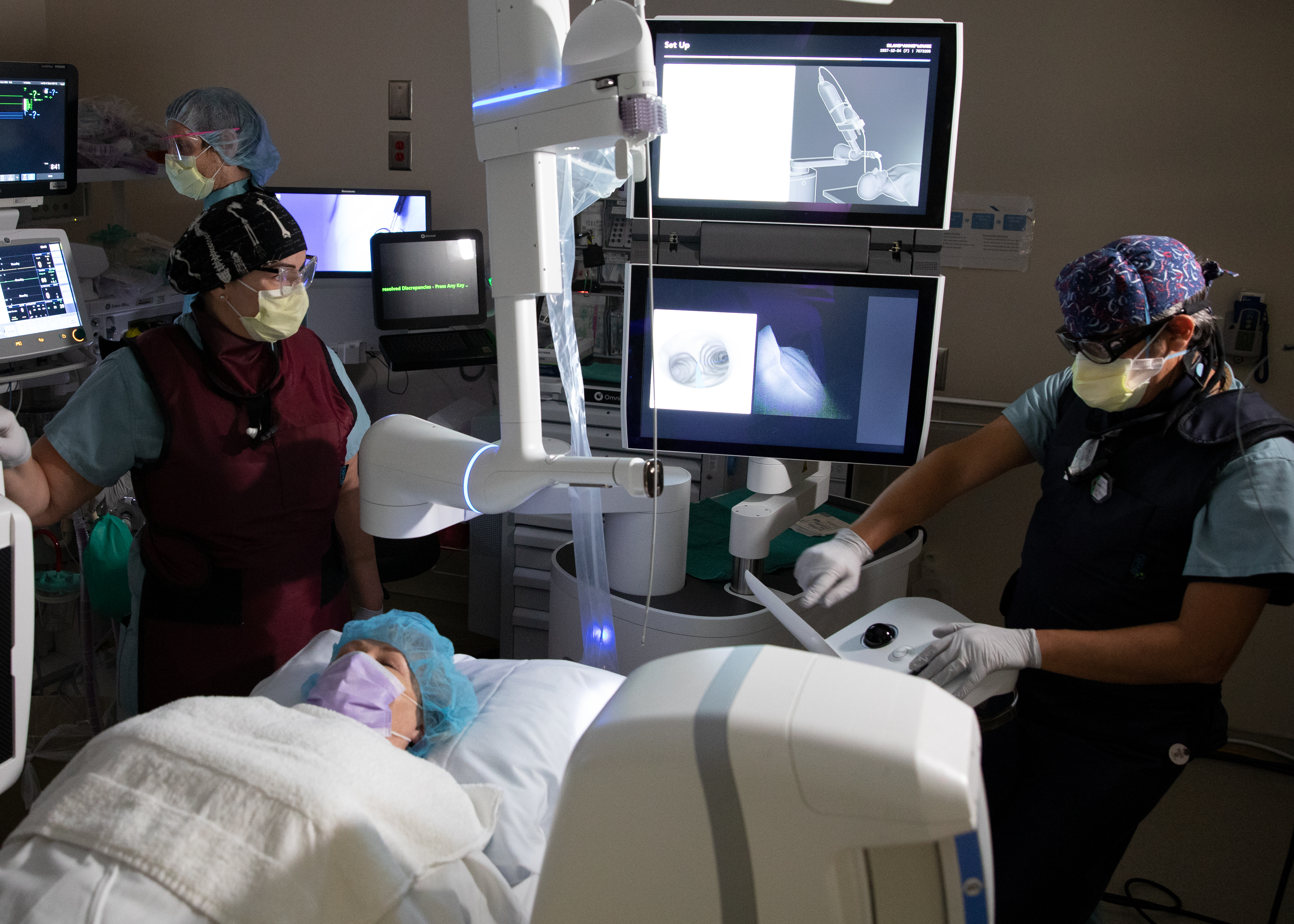Interventional Pulmonology at Emory University offers advanced techniques and procedures that have dramatically changed the approach to diagnosing, staging, and treating lung cancers, as well as pulmonary nodules, benign airway disease, pleural diseases, and endoscopic lung volume reduction. The Interventional Pulmonology Program is the largest and most comprehensive program of its kind in the state of Georgia and offers a multidisciplinary approach to patient care.
The program was established in 2005 to provide patients with access to the latest, minimally invasive, state-of-the-art diagnostic and therapeutic modalities to treat lung and pleural diseases. As one of the first programs in the country, the Emory Interventional Pulmonology program has experienced significant growth since its establishment two decades ago. The program currently has five (5) fellowship-trained interventional pulmonologists on staff with access to provide a full range of interventional services at several major academic hospitals in Atlanta.
Services and Treatments
The Emory Interventional Pulmonology Program offers a comprehensive range of advanced diagnostic, therapeutic, and palliative procedures to treat lung and pleural diseases. We provide minimally invasive, state-of-the-art treatments in both inpatient and outpatient settings, utilizing advanced technology and expert care.
Innovative Procedures for Benign Airway Disease
We provide specialized treatments for benign airway conditions, including:
- Endobronchial Valve Placement for Bronchoscopic Lung Volume Reduction (BLVR) for Chronic Obstructive Pulmonary Disease (COPD)
- Bronchial and Tracheal Stent Placement for Tracheobronchomalacia and Tracheal Stenosis
- Bronchial and Tracheal Balloon Dilation for Airway Stenosis
Advanced Diagnostic Procedures
Our advanced diagnostic capabilities ensure accurate detection and staging of lung and airway diseases. These procedures include:
- Flexible Bronchoscopy (with bronchoalveolar lavage, transbronchial lung biopsy, cryobiopsy, or endobronchial biopsies)
- Endobronchial Ultrasound (EBUS) with Transbronchial Needle Aspiration (TBNA)
- High Definition and Narrow Band Imaging (NBI) Bronchoscopy
- Robotic Assisted Bronchoscopy (Ion™) for biopsy of smaller or peripheral lung nodules/masses
Therapeutic Bronchoscopy for Benign and Malignant Airway Disease
Our treatments include minimally invasive therapies for a wide range of pulmonary conditions:
- Rigid Bronchoscopy (with tumor excision or debridement)
- Endobronchial Laser Therapy
- Argon Plasma Coagulation (APC)
- Cryotherapy
- Airway Electrocautery
- Photodynamic Therapy (PDT)
- Endobronchial Brachytherapy
- Fiducial Placement for Surgical Lung Resection
- Airway Stent Placement and Removal (Metallic, Hybrid, Silicone, and 3D Printed)
- Endobronchial Valve Placement for COPD or Bronchopleural Fistulas
- Foreign Body Removal
- Chronic In-Dwelling Pleural Drainage Catheters (Pleurx™ & Aspira™)
- Thoracic Ultrasound-Guided Chest Tube Placement
- Thoracic Ultrasound-Guided Thoracentesis
- Percutaneous Dilational Tracheostomy
Conditions We Treat
Interventional Pulmonology specializes in the treatment of a variety of lung and airway diseases, including:
- Pulmonary Nodules
- Lung Masses, both benign and malignant
- Tracheobronchomalacia
- Complications from Solid Organ or Hematological Malignancies Affecting the Lungs
- Evaluation of Thoracic Lymph Nodes
- Airway Obstruction (benign or malignant)
- Foreign Body Aspiration
- Tracheal or Bronchial Stenosis and Strictures
- Airway Granulation Tissue
- Complications of Prior Endotracheal Intubation or Tracheostomy Tubes
- Benign or Malignant Pleural Effusions
- Pneumothorax
- Complications of Airway Stents
- Severe Chronic Obstructive Pulmonary Disease (COPD) needing Bronchoscopic Lung Volume Reduction (BLVR)
- Other Complex Airway Disease
Why Choose Emory Interventional Pulmonology?
At Emory, we are committed to providing the highest standard of care for our patients. Our Interventional Pulmonology Program is recognized for its excellence in both patient outcomes and innovation. We leverage advanced diagnostic and therapeutic techniques, along with a multidisciplinary approach to care, to ensure that each patient receives personalized treatment plans tailored to their unique needs. Here’s why our program stands out:
- Experienced Team: Our program is led by a team of five (5) fellowship-trained interventional pulmonologists.
- Comprehensive Care: We offer a multidisciplinary approach to patient care, ensuring the best possible outcomes.
- State-of-the-Art Technology: Our patients benefit from access to the latest minimally invasive procedures, performed using the most advanced diagnostic tools available.
Contact Us
For questions about enrolling your patients in ongoing clinical research studies, please contact Trang Tran, the Administrative Coordinator for Interventional Pulmonology, Midtown.


